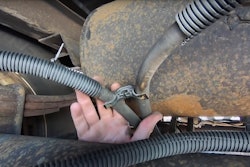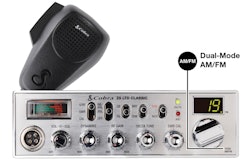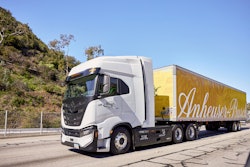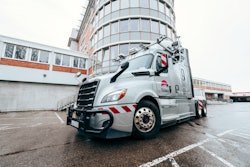A new report from the Clean Air Task Force (CATF) group compared potential performance of hydrogen fuel cell vehicles (FCEV) and battery electric vehicles (BEV), underscoring key advantages to hydrogen in long-haul heavy-duty trucking. Thomas Walker, Transportation Technology Manager at CATF, noted the reality that “vehicle weight and energy needs could make it difficult for trucks to transition away from diesel with onboard battery technology alone."
The new CATF report finds that greater investment in hydrogen-fuel-cell technology for heavy-duty trucks, such as that proposed by recent legislation in the Senate, could be the best way to reduce diesel emissions associated with over-the-road trucking.
Studies projecting the full range of costs associated with hydrogen fuel cell-powered trucks and how those costs will compare to those of battery- and diesel-powered systems suggest very different results based on a variety of assumptions. The new report, called "Zero-Emission Long-Haul Heavy-Duty Trucking," takes a novel approach to similar analysis by comparing the operational performance of BEV and FCEV drive trains and infrastructure as alternatives to diesel trucking on a particular long-haul route in the U.S. -- Los Angeles to Newark, New Jersey.

The study's authors assumed that all stops were Pilot Flying J full-service truck stops, as something of a proxy for a future alternative fueling network, hence the Southern route mapped across the country for the hypothetical, 3,266-mile haul.
As shown in the charts below, to make the run, a hydrogen fuel cell-powered electric vehicle required far fewer stops (three v. eight) than a battery-electric truck, and a huge order of magnitude in terms of time stopped for fueling -- 1.4 hours v. 43.8 hours for the BEV to charge.
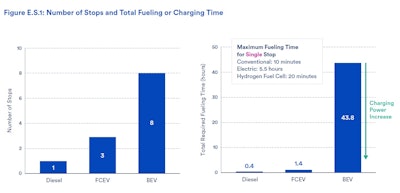 Available room for cargo also more comparable in FCEV and diesel vehicles, given size of the equipment. The report also found that while building charging and refueling infrastructure for BEVs and FCEVs could prove equally challenging, FCEV refueling technology has the comparative advantage of being similar to existing diesel refueling technology, making for fewer barriers to transition.
Available room for cargo also more comparable in FCEV and diesel vehicles, given size of the equipment. The report also found that while building charging and refueling infrastructure for BEVs and FCEVs could prove equally challenging, FCEV refueling technology has the comparative advantage of being similar to existing diesel refueling technology, making for fewer barriers to transition.
The report's findings are similar in some ways to an analysis conducted by the American Transportation Research Institute, though ATRI's comparison was focused less on operational characteristics than life-cycle emissions of the three technologies, finding FCEVs the best performers in that regard given BEVs' huge battery production demand.
Walker did note persistent uncertainty when it comes to the "ultimate total cost of ownership of hydrogen fuel cells and battery electric vehicles" as technology progresses, and urged consideration of both technologies in a variety of applications. And the report does not compare engines powered by hydrogen combustion like the one debuted by Cummins recently.
The report's authors called recent legislation a step in the right direction to “establish a grant program to demonstrate the performance and reliability of heavy-duty fuel cell vehicles that use hydrogen as a fuel source,” while also collecting critical data to inform future investments in hydrogen trucking infrastructure
The grant program, they hoped, would incentivize private investment in the hydrogen fuel cell vehicle industry and accelerate deployment by reducing financial barriers and closing knowledge gaps among those who would be early adopters of the technology.
[Related: Assessing the environmental impact of battery-electric Class 8 trucks]

